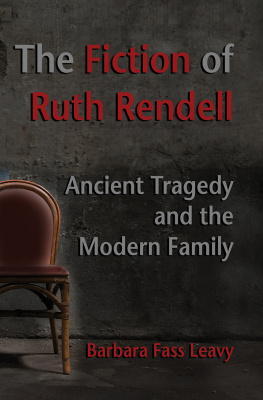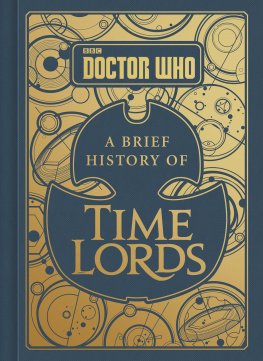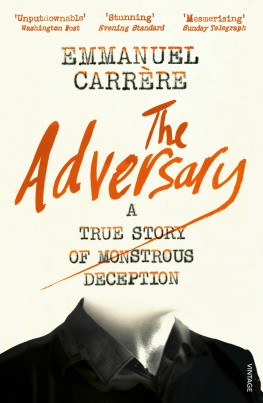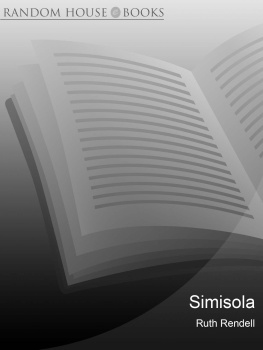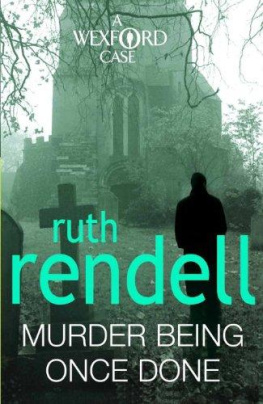PENGUIN BOOKS
THE BLOOD DOCTOR
Barbara Vine is the pen-name of Ruth Rendell, the bestselling crime novelist. She has written many novels, including The Lake of Darkness, The Killing Doll, The Tree of Hands, Live Flesh, Heartstones, The Veiled One and Harm Done. As Barbara Vine she is the author of A Dark-Adapted Eye, which received huge critical acclaim and won the Mystery Writers of Americas Edgar Allan Poe Award; A Fatal Inversion, winner of the 1987 Crime Writers Association Gold Dagger Award; The House of Stairs, winner of the Angel Award for Fiction; Gallowglass; King Solomons Carpet, winner of the 1991 Crime Writers Association Gold Dagger Award; Astas Book, shortlisted for the 1993 Sunday Express Book of the Year Award; The Brimstone Wedding; The Chimney Sweepers Boy; Grasshopper; and The Blood Doctor. All of these titles are published by Penguin. Gallowglass, A Dark-Adapted Eye and A Fatal Inversion have all been the basis of successful BBC television series.
Ruth Rendell is a Fellow of the Royal Society of Literature. In 1991 she was awarded the Crime Writers Association Diamond Dagger for a lifetimes achievement in crime writing. In 1997 she was created a life peer and took the title Baroness Rendell of Babergh.
BARBARA VINE
The Blood Doctor

PENGUIN BOOKS
PENGUIN BOOKS
Published by the Penguin Group
Penguin Books Ltd, 80 Strand, London WC2R 0RL, England
Penguin Putnam Inc., 375 Hudson Street, New York, New York 10014, USA
Penguin Books Australia Ltd, 250 Camberwell Road,
Camberwell, Victoria 3124, Australia
Penguin Books Canada Ltd, 10 Alcorn Avenue, Toronto, Ontario, Canada M4V 3B2
Penguin Books India (P) Ltd, 11 Community Centre,
Panchsheel Park, New Delhi 110 017, India
Penguin Books (NZ) Ltd, Cnr Rosedale and Airborne Roads,
Albany, Auckland, New Zealand
Penguin Books (South Africa) (Pty) Ltd, 24 Sturdee Avenue,
Rosebank 2196, South Africa
Penguin Books Ltd, Registered Offices: 80 Strand, London WC2R 0RL, England
www.penguin.com
First published by Viking 2002
Published in Penguin Books 2003
7
Copyright Kingsmarkham Enterprises Ltd, 2002
All rights reserved
The moral right of the author has been asserted
Except in the United States of America, this book is sold subject to the condition that it shall not, by way of trade or otherwise, be lent, re-sold, hired out, or otherwise circulated without the publishers prior consent in any form of binding or cover other than that in which it is published and without a similar condition including this condition being imposed on the subsequent purchaser
ISBN: 978-0-14-195650-3
To Richard and Patricia, Lord and Lady Acton, with love and gratitude




1
Blood is going to be its theme. Ive made that decision long before I shall even begin writing the book. Blood in its metaphysical sense as the conductor of an inherited title, and blood as the transmitter of hereditary disease. Genes wed say now, but not in the nineteenth century when Henry Nanther was born and grew up and achieved a kind of greatness, not then. It was blood then. Good blood, bad blood, blue blood, its in the blood, in cold blood, blood and thunder, blood thicker than water, blood money, blood relations, flesh and blood, written in blood the list of phrases is endless. How many of them am I going to find apply to my great-grandfather?
Im not sure if Id have liked him, and up till now its been essential for me to like, or at least admire and respect, the subject of the biographies I write. Perhaps, this time, its only going to be necessary for me to be interested in him. And that wont be difficult. Its only because I found out that hed kept a mistress for nine years and, when his fiance died, married her sister (giving her, incidentally, the same engagement ring) that I decided to write his life at all.
Of course I knew, we all knew, hed been an eminent medical man, the acknowledged expert of his day on diseases of the blood and Physician-in-Ordinary to Queen Victoria. I knew that for his services Victoria had given him the peerage Ive inherited, and that he took his seat in the House of Lords in 1896. I knew hed had six children, one of whom was my fathers father, and died in 1909. But although he was distinguished in his day, an acquaintance of Darwin and mentioned as a friend in letters from, among others, T. H. Huxley and Sir Joseph Bazalgette, although he was the first doctor of medicine ever to receive a peerage the great surgeon Joseph Lister got one a year later as a biography candidate I was only keeping him in the back of my mind. In the front of my mind I had Lorenzo da Ponte, Mozarts librettist. Now there was an interesting history: unfrocked priest, political dissident, philanderer, storekeeper, distiller and professor of music at Columbia University. I could have got trips to Italy out of it and maybe Vienna, but reluctantly I had to give him up. I dont have enough musical knowledge. Then the letter came from my sister.
Our mother died last year. Sarah has had the job its always the women who get it, says my wife of sorting out and disposing of or keeping her personal possessions. Among them was a letter from our great-aunt Clara to our grandfather. Sarah thought it would interest me. She even wrote, If youve given up the Marriage of Figaro man, why not Great-grandfather? Ive never seen any of Claras letters before why would I? but Ive a feeling she wrote a lot. My mother probably once had Sarahs task of sorting through her father-in-laws possessions when he came home from Venice to die, found the letter and simply neglected to throw it away.
It makes me feel a bit uneasy, disquieted and at the same time slightly excited, to notice the way Clara, his fourth and youngest daughter, refers to her father not as Father or Dad or Papa but as Henry Nanther. Odd, isnt it? Here is this maiden lady, to use my own fathers expression for her, half-educated, who lived a quiet life in London, who never worked for her living and died at the age of ninety-nine, writing to her brother of their father as if he were some acquaintance she didnt much like. Her letter is dated early in 1966 and must have been sent to Venice. This is what she said:
You always speak of Henry Nanther as if he were some sort of pillar of society and high morality and all that sort of thing. In contrast to you, as you put it. I know you disliked him as much as the rest of us did with the exception of poor George. You will say that if he was a more or less absent father and a remote rather awful figure in the household, that was normal when we were children. But did you know he kept a mistress in a house in Primrose Hill for years and years? I am sure you did not know he was engaged to Mothers sister Eleanor, who was killed in the train. We had all heard the story of the train, but neither Mother nor Henry Nanther ever said he was engaged to her first, and then took up with Mother when she was dead. They kept
Next page


